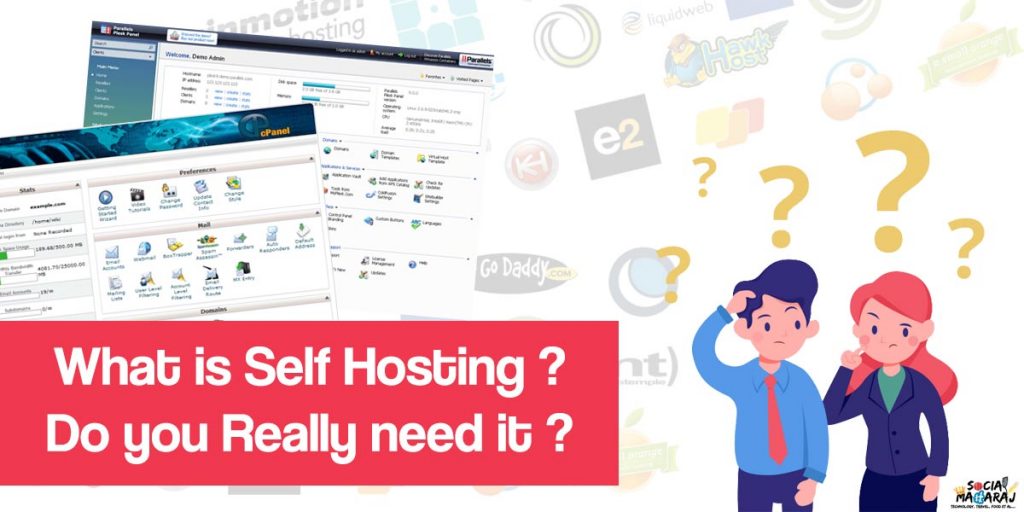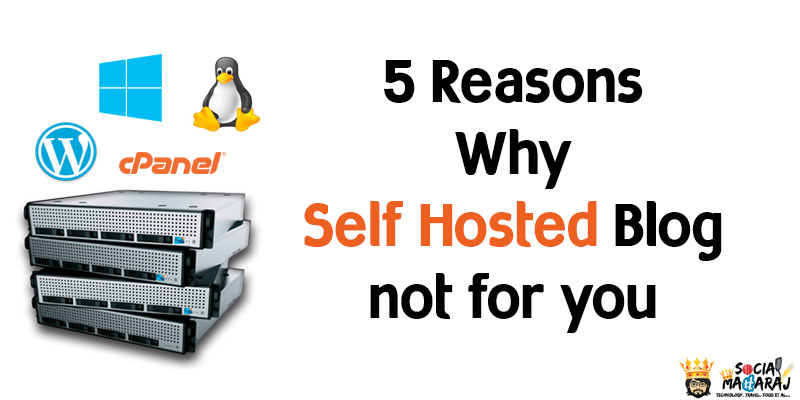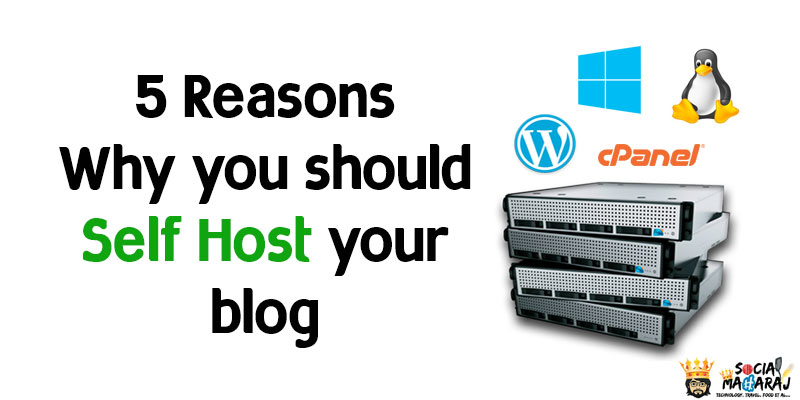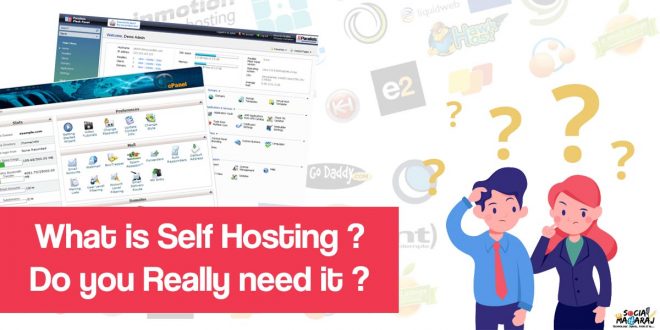I setup my first website in 2007 and it was a self hosted one. Back then I was in class 7th and had absolutely no idea of what this was. My only joy was that I had my own website atulmaharaj.com and the fact that I was giving back to the internet. I started blogging in 2012 and it has been an amazing journey. Started with a free WordPress.com blog and eventually moved to self hosting few years later. I receive a lot of queries related to Self Hosting and I realized that there is a confusion with this term. Hence this blog post on What is Self Hosting and do you really need it ?
Anatomy of a Website, Blog – The Technical Aspects
Before I actually talk about what is self hosting, let me explain you how things work on the internet. This explanation is going to be for an absolute layman. If you are a technical geek, you may find few things absurd here, please ignore. This is supposed to be as simple as it can be. Hence if you are well versed with this concept, feel free to move to the next section 🙂

What is a website ?
A website is a collection of pages that are interlinked with each other. Pages can contain text, images and videos. It makes use to technologies like HTML, CSS, JavaScript, React, Python to name a few.
All these pages are essentially files. Just like normal text or ppt file you have on your computers. These contain special code with your web browser – Chrome, Firefox, Edge etc. – understand. All these files are placed inside a folder. This folder resides on a hard disk. Just like you have your folders in C drive or d drive. And this disk resides on another computer known as the Server.
The only difference here is that, the folder is on someone’s else computer. It doesn’t reside on your computer.
So then, how do we connect to websites
Computers don’t understand English (or any human language) they only understand numbers and codes. Every computer connected to a network has its own address what is called as IP address. Even the computer you are using has a unique IP address. Simply go to Google and type “What is my IP address”
Now, this folder where all your website files are placed is on a different computer which has a different IP address. In order to connect to that folder, you need to connect to that server first, you need the IP address of the server. And since you place your files on someone else’s server, we call it hosting. Basically that server is acting as a host for your files. And you pay for that hosting service. I hope you understood the thing till here.

The challenge here is that we humans don’t talk in code and computers talk only in code. So how do we bridge that gap ? That’s where a Domain Name comes into play and also a Domain Name System or DNS.
How do Domains Work and what is DNS
Domain Name is the url of the website. For instance google.com is a domain name. Socialmaharaj.com is a domain name. This is very easy for humans to understand and remember. However, like mentioned earlier, computers don’t understand this. Hence we created a table called Domain Name System or DNS. Consider this as a table with two columns. In one column you have the domain name and in the other you have the IP address to the server.
- When you enter amazon.com in the address bar of the browser, the computer first connects to a DNS server. There it will search for amazon.com in the table.
- Once it finds it, it knows the IP address of the server where the amazon folder is present. It will reply with the IP address of amazon.com to your computer.
- Your computer quickly connects to that server and that folder using the IP address
- If the connection is successful, you see my blog, if it is not you get an error.
So now I guess, we have understood how websites work. Let us now get into the real question What is Self Hosting ?
What is Self Hosting ?
Assuming that you’ve read the complete article earlier or you are aware of the hosting terminology, let’s understand what is self hosting. When you create a website or a blog, a folder is created for your with the name of your website on the server. This is a completely automated and quick process. That is why when you register for a new blog, you are able to see it running in minutes. There are two cases which needs attention.
Case 1 Hosting: When you register for a new blog on Google’s Blogger of WordPress.com they create a folder for you with the domain name you choose/provide. And whenever you post something new on your blog, a new file is created in the background. In this case you aren’t paying them as they provide this service for free. However, with this type of hosting you don’t have access to your files. You cannot access the folder and modify things. They take care of the back end, you cannot control it.
Case 2 Self Hosting: With self hosting, you essentially buy a space on someone’s computer (server) where you get your own folder based on the domain name provided. In the case of self hosting, you have complete access to the folder. You can access your website ‘from the back door‘ and make changes. So in case your blog is down and you want to know the issue. You can simply login to this server and see what the error is. For this facility, you pay a certain fee yearly.
Do you really need to be Self Hosted ?
No. You don’t really need to be self hosted. Until unless you want full control of your website/blog, you don’t need self hosting. Especially for beginners and non tech-savy folks, Self Hosting is not for you. I’ve been doing it since 2007 and trust me it isn’t easy for a newbie. There are a lot of things for which you’ll take time to understand.
You want to focus on your writing and not worry about what’s happening in the background. I have even written a couple of posts earlier – Why Self Hosting is for you ? and Why Self Hosting isn’t for you ? Do check them out for more details.

In short, you don’t need to be self hosted.
You only need it if your website/blog is growing and WordPress.com or Blogger can’t handle it. Also since these are blogging platforms, you don’t know when they’d shutdown. So for such unforeseen scenarios, you can go for self hosting. Lastly, if you are a geek and want to experiment, you should go for self hosting.

Custom Domain Name vs Self Hosting
A common myth with most of the bloggers is that if you need a custom domain name, you need to be self hosted. If you’ve read this blog post right from the beginning, you know that hosting and domain names are two separate things. This is absolutely wrong – you don’t need to be self hosted to get a custom domain name of your choice !
Many bloggers tell me that whenever brands approach them for collaboration they ask for self hosting. No ! Why would the brand worry whether your website / blog is self hosted or managed by someone else ? All they want is a custom domain name. They don’t want a socialmaharaj.wordpress.com or a socialmaharaj.blogspot.com. All they want is socialmaharaj.com. For this, you just need the domain name.
Tip: If you are just starting out as a blogger, I’d strongly suggest to get a custom domain name. Buy your domain name. Once you have that, simply connect it with a Google Blogger blog or a WordPress.com blog. I’m linking to two blog posts I wrote about using custom domain names with Blogger and WordPress.com.
Do note that linking your custom domain name with a WordPress.com blog is chargeable while for Google it is free. Once you are established and your blog is growing, then switch to a self hosted blog.
Now, do you really need self hosting ?
If you’ve read this blog post completely the answer should be a No. For any outreach or monetary aspects, a custom domain is what is needed. Nobody, literally nobody, bothers where and how your website is hosted. There was a drive on going self hosted a few years ago on Twitter. Some provider was providing really cheap web hosting and most people opted for it. Few liked it and understood it, many didn’t. And when they wanted to move out, they couldn’t.
I hope this blog posts answers your queries regarding what is self hosting. If you still have any concerns, feel free to comment below or tweet to me at @Atulmaharaj or DM me on Instagram.
 SocialMaharaj Technology, Travel, Food et al
SocialMaharaj Technology, Travel, Food et al




Good points and helps anybody who is serious about blogging …. 🙂
Thanks a lot sirji, glad you found this insightful 🙂
Thank you so much for posting this and clarifying a lot of my doubts . It did clear a lot of my queries and was immensely useful.
Thank you Chinmayeeji, I’m glad you find this helpful. Tried to keep it as easy as possible. And in case you have any issues, you can always DM 😇
Atulji, I do not know how to thank you enough. The post felt so personal as if it was written for a novice like me. Thank you for helping me out and handling my silly questions. Means a lot.
It ks an expert opinion indeed. Helped me took some correct decisions when my head was cluttered by multiple opinions.